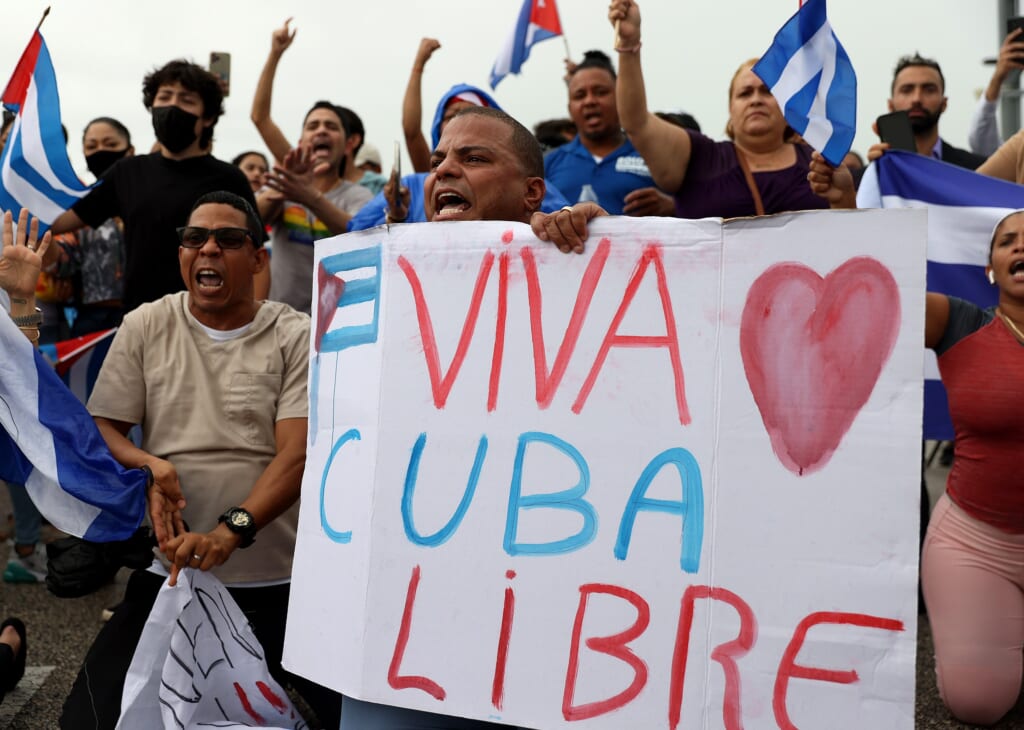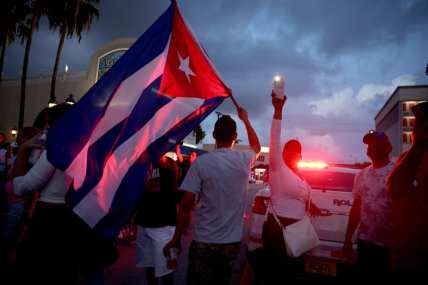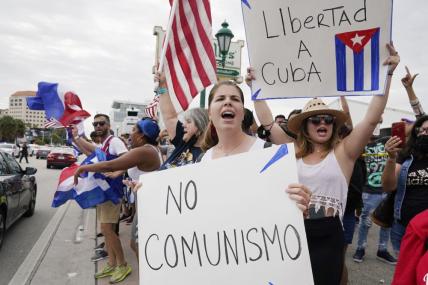Afro-Cuban music group’s song is the backdrop of Cuba’s unprecedented protests
A hip-hop song has become the soundtrack to the protests happening in the embattled island nation
A politically charged hip-hop song has become the backdrop for the civil unrest that has rocked Cuba this summer.
The island nation has been plagued by shortages of food, electricity, medicine, and other vital resources and fed-up Cubans are taking to the streets to protest.

The Cuban government is also being called out by local musicians in the anti-regime video, “Patria y Vida,” which has garnered nearly six million views on YouTube.
“No more lies. My people demand freedom. No more doctrines!” the song says, as reported by NPR. The viral hit calls for people to shout “patria y vida, which, per the report, is a spin on a Castro-era slogan of “patria o muerte” — homeland or death.
The lyrics include:
Great fanfare for the 500th [anniversary] of Havana
While in the homes the people no longer have food
What are we celebrating
They hurry to exchange Che Guevara and Martí for money …
Between you and me there is an abyss
Advertising a paradise in Varadero, while mothers cry for their children gone.
The song declares, “It’s over now! And we’re not afraid.”
No more lies! My people demand freedom! No more doctrines! Let us no longer shout “Homeland or Death!” but “Homeland and Life!”
And start building what we dreamed of
What they destroyed with their hands
Stop the blood from running for daring to think differently
Who told you that Cuba belongs to you?
If my Cuba belongs to all my people —
Se acabó! Your time has expired, silence has been broken.
Ya se acabó! The laughter is over and the crying is already flowing.
Ya se acabó! And we’re not afraid, the deceit is over.
Ya se acabó! Sixty-two [years] of doing harm.
The protest track is a collaboration between the Miami reggaeton band Gente de Zona (Alexander Delgado, Randy Malcom), Cuban expats Yotuel Romero and Descemer Bueno, and Havana residents Maykel Osorbo and El Funky, per The American Spectator. Cuban authorities reportedly arrested Osorbo after the song’s release.
“Before the revolution, we had a beautiful Havana; now we have ruins,” Romero told Billboard in February. “From that point on, I said, ‘I’m not going to be quiet anymore.’ “
“Patria y Vida” has become the official anthem of the unprecedented protests that erupted in April. NPR‘s Carrie Kahn called it a sign of “a growing movement challenging the regime like we haven’t seen in decades.”
Thousands of Cubans have participated in protests against Cuban President Miguel Díaz-Canel. They are demanding more freedoms, more life-sustaining resources, and access to vaccines amid a reported spike in COVID-19 cases and deaths in recent weeks.
This month, protestors gathered in Havana to push back against a government they allege has left them starving during the ongoing pandemic. President Joe Biden is urging Cuban officials to take their pleas seriously, theGrio reported.
“We stand with the Cuban people as they bravely assert their fundamental and universal rights, and as they all call for freedom and relief from the tragic grip of the pandemic and from the decades of repression and economic suffering,” read the caption on the official POTUS Twitter account, along with a link to Biden’s statement.
President Biden said he strongly supports the protesters.
“The Cuban people are demanding their freedom from an authoritarian regime,” he said during a White House event Monday. “I don’t think we’ve seen anything like these protests in a long, long time if, quite frankly, ever.”
Biden added, “The U.S. stands firmly with the people of Cuba as they assert their universal rights. And we call on the government of Cuba to refrain from violence in their attempt to silence the voices of the people of Cuba.”
As previously reported by theGrio, the United States Coast Guard in Miami is monitoring any activity aimed at increasing “unsafe and illegal” crossings between Florida and Cuba in response to rare street protests on the island.
“The government is in debt and has no money,” reporter Nora Gámez Torres of the Miami Herald and El Nuevo Herald told NPR. “So the population has been enduring severe scarcities of food and medicine.”
This story contains additional reporting from Blue Telusma and The Associated Press.
Have you subscribed to theGrio’s “Dear Culture” podcast? Download our newest episodes now! TheGrio is now on Apple TV, Amazon Fire and Roku. Download theGrio.com today!


